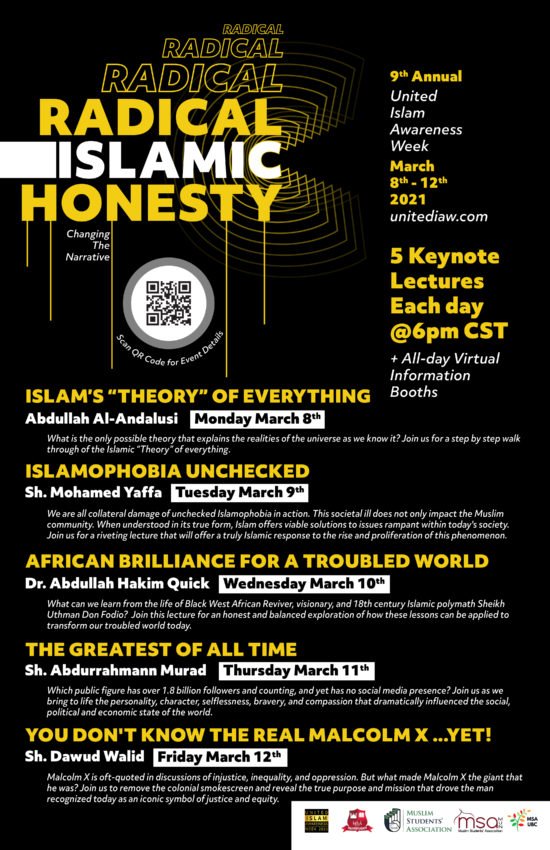
Insightful conversations and discussions at the Muslim Student Association’s annual event aimed to unite Muslim and non-Muslim students against Islamaphobia.
The MSA at the University of Saskatchewan hosted their ninth annual United Islam Awareness Week from March 8 to 12. The online event gathered upwards of 1000 attendees over the week, including around 100 U of S students, according to the organizers.
Abdirahman Ali, the president of the MSA and third-year sociology student, says it is important to speak about the rise of Islamophobia.
“Educating both Muslims and non-Muslims about Islam is one of the biggest solutions against Islamophobia,” Ali said.
Ali adds that Islamophobia is misunderstood by many people.
“A lot of the time, Islamophobia is translated to irrational hatred towards Muslims but in reality it is way deeper than that,” Ali said, “Someone might not openly be hateful to you but can be very Islamophobic and have very damaging effects to [Muslims].
Islamophobia appears in different forms, says Ali. He adds that “people [are] afraid about the ideas that Muslims have.”
“It trickles down to the Muslim community, where Muslims become afraid of their identity,” Ali said.
One of the keynote lectures at UIAW, titled “Islamophobia Unchecked,” aimed to normalize Islam and give “truly Islamic solutions,” says Ali. It also covered how Islamophobia comes from people problematizing Islamic views and making the Islamic voice not a part of the Canadian voice.
Rida Pervaiz, vice-president of the MSA and second-year pharmacy student, stresses the importance of addressing issues concerning Islam. She says that the recent attack at an online memorial event hosted by the MSA on Jan. 29 shows the “increase in hate and faith-related attacks towards Muslims.”
“Even with COVID, a time where we should be coming together to support one another, there is an increase in Islamophobia,” Pervaiz said.
Pervaiz says that students need to acknowledge and tackle these issues as a community at the university.
“United Islam Awareness week … was important because we were able to see the damages of Islamaphobia and not only does it impact the Muslim community but [it also] causes this widespread systemic harm to the wellness of the individuals and entire communities,” Pervaiz siad.
Aside from the keynote lectures, there were also different virtual drop-in booths on topics such as Islamic Trivia, Ask a Muslim Anything, General Da’wah, and Stories and Reflections.
Student leaders all over Canada had a chance to share their personal experiences through stories, says Ali.
“The amazing thing is that all of the stories that they were sharing were so relatable… We all knew each other and we had the same problem,” Ali said. “It makes you feel that you have a community of others like you that are struggling in the fight against Islamophobia. It really encourages you to be proud of your identity.”
Ali says that Muslims need to be seen as they are.
“Do not stereotype Muslims and put them into categories,” Ali said. “Do not pick and choose the Muslim that you ‘like,’ but rather, allow them to tell you about Islam in their own words.”
—
Kristine Jones A. Del Socorro | Culture Editor
Photo: Supplied | Muslim Students’ Association